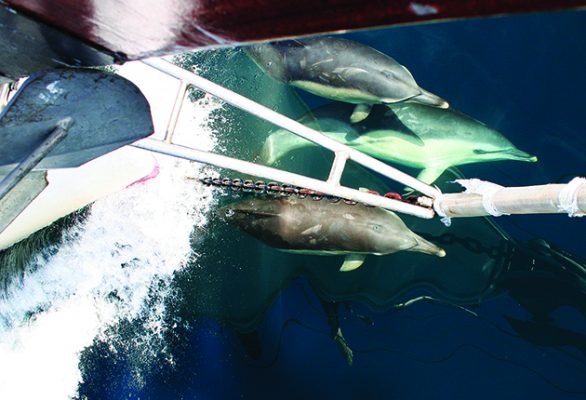The charity Whale and Dolphin Conservation is warning water users not to disturb or harass marine wildlife and to report those who do
Sailors and other water users are being encouraged to report those who disturb marine wildlife around the UK coastline.
With COVID-19 restrictions easing, the charity Whale and Dolphin Conservation (WDC) is reminding the public not to risk legal action by disturbing dolphins and other marine life.
The Seal Alliance has also launched a campaign to Give Seals Space and reduce the impact that human disturbance has on the mammals.
As a result of the pandemic, marine wildlife have enjoyed quieter waters around the UK.

Dolphins are protected from disturbance under the Conservation (Natural Habitats) Regulations 1994. Credit: WDC
‘WDC fears that dolphin disturbance incidents in the waters around the UK involving members of the public using leisure craft, jetskis, kayaks and paddleboards could increase,’ said a spokesman for the charity.
‘Of particular concern is the lack of awareness of the existing laws around disturbance by people using these craft, or who attempt to jump in and swim with dolphins in the sea.’
Marine mammals are sensitive to disturbance, especially when they have young, are resting, feeding or socialising.
Human disturbance can frighten them and scare them away from important habitats, and in extreme cases, injury or kill them.
Continues below…
Killer whale interaction advice issued to skippers
The Atlantic Orca Working Group has issued new advice to skippers after over 45 interactions between boats and the killer…
A sailor’s guide to whales and dolphins
Spotting wild whales and dolphins while sailing is a joy, says marine conservationist Anna Moscrop
Are whales & orcas really a threat to cruisers?
As orca interactions with small sailing yachts rise, Katy Stickland investigates if orcas and whales are really a threat to…
Eco friendly sailing: Best practice for green yachting
How easy is it to go eco friendly sailing? We look at the steps cruisers can take to minimise their…
Giving marine wildlife space is important, watch them from a good distance and don’t crowd them.
Incidents are thought to be much higher because many boat users and holiday makers simply do not know what the rules are or how to report incidents they witness.
Prosecutions are rare, yet disturbance is a regular occurrence where the waters are busy and coastal wildlife is most accessible.

Common dolphins in the south-west of UK. Credit: MCR/IFAW
WDC staff and volunteers regularly witness disturbance first-hand and receive many reports from concerned marine wildlife enthusiasts, which has prompted the awareness drive.
Cetaceans are protected under the Conservation (Natural Habitats) Regulations 1994.
This includes protection from disturbance (whether it be reckless or deliberate), harassment, killing and injury, with offences subject to a fine of up to £5,000.
The WDC campaign is being backed by the National Wildlife Crime Unit (NWCU).
Its chief inspector, Kevin Kelly urged the public to ‘give marine mammals space to exhibit natural behaviour in their natural environment without harassment or disturbance. Keep your distance, show respect and be responsible.’
Responsible marine wildlife watching tips:
- Keep your distance. Avoid getting too close, especially if calves are present.
- Approach carefully from behind and to the side, make sure you are aware of best practice.
- Three is a crowd – there should never be more than two boats within the 300 metre ‘caution zone’
- Don’t overstay your welcome – 15 minutes is enough.
- Avoid repeated disturbance; consider staying away if the wildlife has already spent a prolonged period with vessels nearby.
- Do not make sudden changes to speed and direction
- Do not approach from directly in front or behind
- Do not drive between or scatter groups, especially mothers and calves
- Do not chase or repeatedly approach individuals
- Do not box them in – take care not to trap individuals between your vessel and other vessels or the shore
- Do not swim with them or try to touch or feed them.
Sailors and other members of the public who witness suspected cases of disturbance are being advised to report it to the police via 101.
The advice is:
- Tell the operator that you are reporting a wildlife crime and ask for an incident number to ensure that reports can be tracked.
- Tell the operator as much information as possible, including:
- the date, time and location of the disturbance
- the behaviour of any vessels and of the whales and dolphins before, during and after the event
- if possible, the species involved
- the duration of the interaction
- any identifying features of the people or vessel involved, such as the boat name and the clothes worn.
In the June 2021 issue of Yachting Monthly, we will be revealing the 10 best cruises in the British Isles for wildlife watching.
It will be on sale from 29 April 2021.
Enjoyed reading this?
A subscription to Yachting Monthly magazine costs around 40% less than the cover price.
Print and digital editions are available through Magazines Direct – where you can also find the latest deals.
YM is packed with information to help you get the most from your time on the water.
- Take your seamanship to the next level with tips, advice and skills from our experts
- Impartial in-depth reviews of the latest yachts and equipment
- Cruising guides to help you reach those dream destinations
Follow us on Facebook, Twitter and Instagram.







